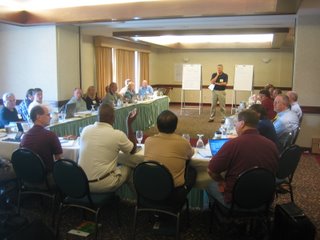EQUIPPING AND MOBILIZING CHURCHES FOR COMMUNITY TRANSFORMATION
 Had a very productive time in Charlottesville, VA last week with the finest equippers of lay-led ministry in the country. Assembled were the folks whose books you read and who influence hundreds of thousands through their training, teaching and mobilizing--Heidi Unruh, Don Simmons, Amy Sherman, Jimmy Dorell, Jay Van Gronigan, etc. The meeting was pulled together by good friend Andy Rittenhouse of Knoxville and facilitated by Gary Edmonds, formerly of InterDev. His job of hearding cats was done masterfully in the three day session.
Had a very productive time in Charlottesville, VA last week with the finest equippers of lay-led ministry in the country. Assembled were the folks whose books you read and who influence hundreds of thousands through their training, teaching and mobilizing--Heidi Unruh, Don Simmons, Amy Sherman, Jimmy Dorell, Jay Van Gronigan, etc. The meeting was pulled together by good friend Andy Rittenhouse of Knoxville and facilitated by Gary Edmonds, formerly of InterDev. His job of hearding cats was done masterfully in the three day session.SCOPE OF NEEDS
coaching / training process
identify churches most ready ("hungry") for training have multiple entry points for individuals and congregations effective multiplication -- church-to-church coaching optimum coaching case load and time frame alternatives to group / class training — e.g. email web-based clearing house for cataloguing ideas, resources, training, etc.
training curriculum — qualities and content
practical, relevant, flexible biblically based -- kingdom of God theology, role of the church in the world tools to assess realistic ministry options and develop a strategic ministry plan address "nuts & bolts" issues — funding, staffing, volunteer recruitment/trainingchange paradigm: awareness / interest / knowledge / attitude / legitimating / practicephased process: initial start-up, development and maturation of community ministrydistinguish shared core elements and personalized optional "toolbelt" promote partnership skills story-telling — how God is using churches to transform individuals and communities
mobilizing members
drawing in all church members, beyond the core of activistsdealing with members' time constraints — create "time budget"effective communication system — prevent "information overload" mobilizing via small groups (e.g. Sunday school classes)making the most out of volunteers ("high capacity volunteers")
spiritual dynamics
churches need theology of serving / collaboration role of serving others in growth of personal faith spiritual dynamics to sustain ministry at a national, local, congregational, and individual level accommodate spiritual diversity within ministry groups / partnerships
relationships
dealing with resistance and conflict within the church connecting with the community dealing with diversity in the community collaborations between high and low "resource churches" collaborations between churches and secular organizations networking within a region and among regional intermediaries role of academic institutions (Christian colleges & seminaries)
balance
ministry by individuals (informal) / corporate church body (organized) established church ministries / new initiatives ("culture of innovation") local / global efforts ("ministry" / "missions") community ministry / other church ministry (discipleship, evangelism, children's ministry, etc.) transformation at individual / community level compassion / justice challenge / celebration content / relationships evaluation general criteria for ministry effectivenessresearch and standards for assessing methodology bottom line of outcomes vs faithfulness — ending poverty vs doing good deedsstandardized measures of community transformation


0 Comments:
Post a Comment
<< Home